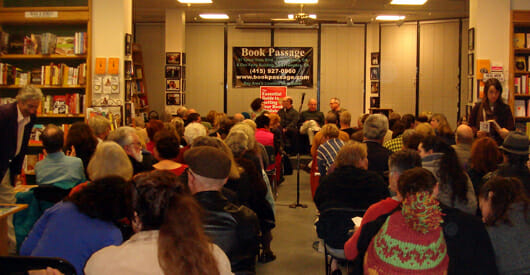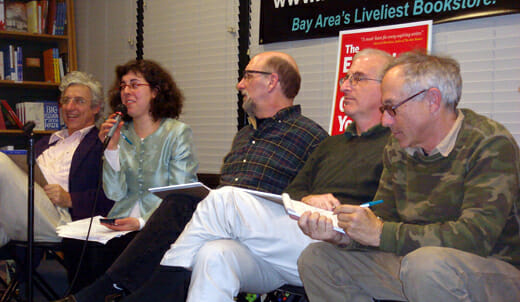
Tonight Book Passage in Corte Madera, California, just north of San Francisco, hosted the Pitchapalooza tour. Arielle Eckstut and David Henry Sterry, co-authors of The Essential Guide to Getting Your Book Published are on tour, but in their own way. Instead of giving a reading, they stage an opportunity for local writers to give a pitch, with the winner taking away an introduction to an agent or publisher for their work.
As you might imagine, these events are well-attended. Tonight about 125 people packed the bookstore, and many signed up to give a pitch. About 22 people got to use one minute to pitch their book. And it was well worth doing.
Arielle Eckstut is a long-time literary agent and author. David Henry Sterry is a screenwriter, actor and the author of many books of his own. Also on the panel were agent Andy Ross and best-selling novelist Sheldon Siegel, and me.
Live and Die in One Minute
A microphone was set up in the middle of the room and writers, chosen at random, were sent to use their one minute to make their pitch. As the evening went on, we also received an education in just how important it is to fine tune your pitch, to make your pitch effective, entertaining, and full of information and life.
Some writers seemed like naturals at the mike, others were clearly in the grip of their own nerves. Each pitch received appreciation and many received astute suggestions on how to improve their pitch, or their concept.
For instance, David encouraged presenters to make him laugh rather than tell him their book was funny. Or to inspire him with their words, rather than tell him they wrote something inspirational. To give specifics instead of generalities, and to know exactly what category your book is aimed at, exactly who the audience is for what you’ve written.
The point of the pitch itself came home when Arielle paused to explain how your pitch, the essence of what your project is about, is what attracts an agent. The agent, in turn, will use your pitch to present your book to an editor. This same pitch may turn up as back cover copy on your book when it’s published, and then be used by the publisher’s reps when they sell the book to retailers. At the end of the chain, booksellers will use the pitch to explain your book to likely buyers in the store.
Memoir, Memoir, Memoir
Although both agents on the panel emphasized repeatedly how difficult it is to sell memoirs to publishers, about 75% of the books pitched were memoirs of one kind or another. And the winner, a woman who writes a column about being single, adroitly pitched her book more as an expose and social comedy, never mentioning the dreaded “M” word.
It was exciting to see the energy for writing and publishing brought by the attendees, and it was an honor in a way to listen to people present themselves and attempt to help them improve their chances. Set in an independent bookstore, the hopes and dreams of all those writers exerted a force.
The authors were also gathering email addresses and handing out cards for their author services company, The Book Doctors. Everyone who bought a book at the event was informed they were entitled to a free half-hour telephone consultation.
There were a number of members of the Bay Area Independent Publishers Association (BAIPA) there, and a few gave their pitch. One member pitched with her self-published book as a visual aid, and I was proud of that.
This was an evening for traditional publishing, and a valuable opportunity to peek into that world and see how decisions are made, how projects are evaluated. A lot of experience with the commercial end of selling books was in evidence, and that experience is invaluable.
Jill asked one of the authors—who said he had gotten hundreds of rejections over the years—if he had ever considered self-publishing. He looked at her like she had called him a dirty name, and said, “Of course not.”
On the whole, it was one of the most entertaining and interesting evenings we’ve had in a long time. If the Pitchapalooza tour stops near you, don’t miss it.



